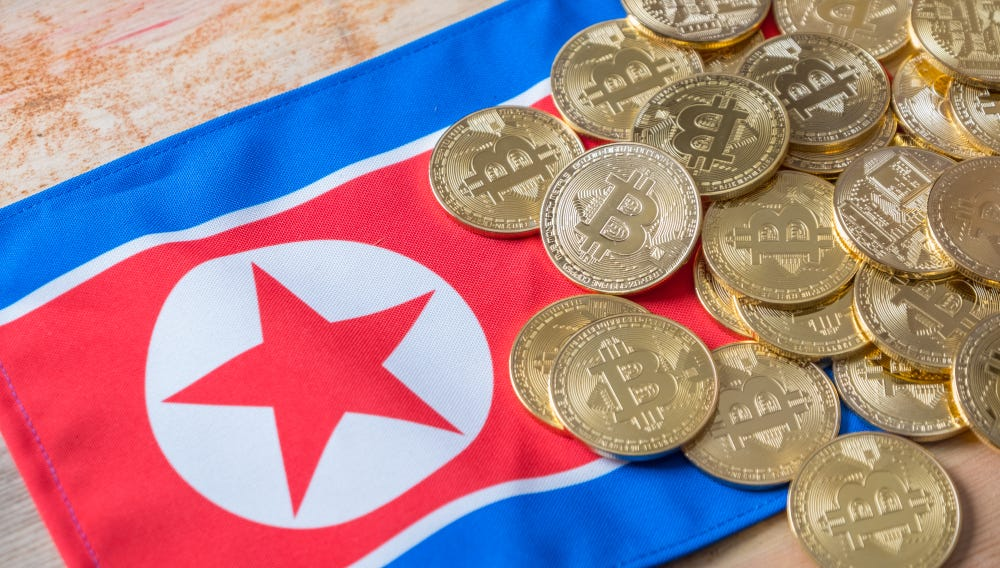North Korea’s use of cybercriminal activities to fund its nuclear and missile programs has become increasingly sophisticated over the years.
According to a report by Microsoft, North Korean hackers have stolen a staggering $3 billion worth of cryptocurrency since 2017, with significant portions of this illicitly acquired wealth being funneled into the country’s weapons development programs.
The sheer scale of the operation, including the use of ransomware and other cybercriminal tools, showcases the lengths to which the regime is willing to go to bypass international sanctions and secure funding for its strategic goals.
In the latest revelations, Microsoft’s ‘Digital Defense Report for 2024’ provides an in-depth look at how these funds have been instrumental in financing over half of Pyongyang’s nuclear development efforts.
The report also sheds light on the emergence of new North Korean hacking groups, emphasizing the growing sophistication of their tactics and the increased investment in cybercrime.
A Growing Cybercriminal Network and Its Financial Impact
One of the most alarming aspects of Microsoft’s findings is the sheer amount of money that North Korean hackers have been able to steal. Between $600 million and $1 billion of the total $3 billion was stolen in 2023 alone.
These attacks have largely targeted the cryptocurrency industry, taking advantage of its decentralized and relatively anonymous nature. Cryptocurrencies are especially appealing for rogue states like North Korea, which face severe economic sanctions that restrict their access to traditional financial systems.
The scale of these operations and their success indicate a well-coordinated, state-backed effort. This effort is not limited to a single group or method but involves a variety of cyberattacks, including phishing, hacking, and the deployment of ransomware. These tactics are designed to exploit vulnerabilities in both the private and public sectors.
Read : 1.4 Million People Want to Join Army for Sacred War Against South Korea: North Korea
Microsoft has identified four new hacking groups—Moonstone Sleet, Jade Sleet, Sapphire Sleet, and Citrine Sleet—which have been instrumental in North Korea’s cyber activities. Moonstone Sleet, in particular, has developed a custom ransomware variant, using it against unidentified entities in the aerospace and defense sectors for both intelligence gathering and financial gain.
Read : North Korea’s Rocket Carrying Second Spy Satellite Explodes
This combination of espionage and financial theft highlights the dual-purpose nature of North Korea’s cyber operations, which serve both its intelligence needs and its economic interests.
Cybercrime as a Tool for Nuclear Development
The funds stolen by North Korean hackers have played a crucial role in financing Pyongyang’s nuclear program. According to Microsoft’s report, over half of North Korea’s nuclear development efforts have been funded by these illicit activities.
This finding is significant, as it underscores the direct link between North Korea’s cybercrimes and its ability to continue developing weapons of mass destruction, despite heavy international sanctions.
North Korea’s nuclear program has long been a point of contention in global geopolitics. The regime’s efforts to acquire nuclear weapons have led to widespread condemnation and sanctions from the international community, particularly from the United Nations and the United States.
These sanctions are designed to limit North Korea’s ability to fund its weapons programs by cutting off its access to international markets and financial systems.

However, North Korea has been remarkably adept at finding alternative sources of funding, with cybercrime emerging as one of the most effective methods. By targeting cryptocurrency organizations, North Korean hackers have been able to steal vast sums of money while avoiding detection for extended periods.
The decentralized nature of cryptocurrencies makes it difficult for authorities to trace the funds or recover them once stolen. This has allowed North Korea to continue funding its nuclear program despite the best efforts of the international community.
Microsoft’s report also points to the increasing sophistication of North Korea’s cyber activities. The emergence of new hacking groups and the development of custom ransomware are clear signs that the regime is investing heavily in its cyber capabilities.
This investment is paying off, as evidenced by the sheer scale of the funds stolen and the impact those funds are having on North Korea’s nuclear development.
The Geopolitical Implications and Global Response
The revelation that North Korean hackers have been able to steal $3 billion worth of cryptocurrency to fund their nuclear program has significant geopolitical implications. It not only highlights the threat posed by state-sponsored cybercrime but also raises serious questions about the effectiveness of current sanctions and international efforts to curb North Korea’s nuclear ambitions.
The increasing use of ransomware and other cybercriminal tools by nation-states like North Korea, as highlighted by Tom Burt, Microsoft’s vice president of customer security and trust, is a worrying trend. It suggests that states are becoming more aggressive in the cyber domain, with ever-growing levels of technical sophistication that reflect increased investment in resources and training.
Microsoft’s report also points to rising cyber threats from other state-backed actors, particularly those related to Russia, China, and Iran. This is particularly concerning given the current geopolitical climate, with ongoing conflicts in Europe and the Middle East and rising tensions in the Asia-Pacific region.
The potential for cyberattacks to disrupt critical infrastructure, steal sensitive information, or fund hostile activities like North Korea’s nuclear program is a serious concern for governments and private companies alike.

In response to these growing threats, South Korea, the United States, and Japan have agreed to strengthen their joint efforts to combat North Korea’s illegal cyber activities. These efforts will focus on targeting the virtual currency industry, which has been a primary target for North Korean hackers.
The three countries have emphasized the importance of working closely with the private sector, particularly cryptocurrency service providers, to raise awareness of Pyongyang’s cyber threats and develop strategies to prevent future attacks.
The partnership between these countries is crucial in the fight against North Korean cybercrime. By working together and sharing information, they can develop more effective strategies to detect and prevent attacks.
In addition, increased cooperation with the private sector will help to close the gaps that North Korean hackers have been exploiting, making it more difficult for them to steal funds and use them to support their nuclear program.
The findings from Microsoft’s report are a stark reminder of the growing threat posed by state-sponsored cybercrime, particularly from countries like North Korea. The fact that Pyongyang has been able to steal $3 billion worth of cryptocurrency to fund its nuclear program highlights the serious consequences of allowing cybercriminals to operate with impunity.
The development of new hacking groups and the increasing sophistication of their tactics suggest that North Korea’s involvement in cybercrime is only going to grow in the coming years. This makes it more important than ever for the international community to take decisive action to combat these threats.
Governments must work together to strengthen cybersecurity measures, share intelligence, and develop more effective strategies to prevent future attacks.

At the same time, the private sector has a crucial role to play in this fight. Cryptocurrency service providers, in particular, must take steps to protect their platforms from cyberattacks and raise awareness of the risks posed by state-sponsored hackers.
By working closely with governments and other stakeholders, they can help to reduce the vulnerability of the cryptocurrency industry and prevent North Korea from continuing to use it as a source of funding for its nuclear program.
In the face of these growing threats, it is clear that cybersecurity must be a top priority for both governments and private companies. The stakes are simply too high to ignore.
With the right strategies and cooperation, it is possible to mitigate the risks posed by state-sponsored cybercrime and prevent countries like North Korea from using stolen funds to further their nuclear ambitions.

